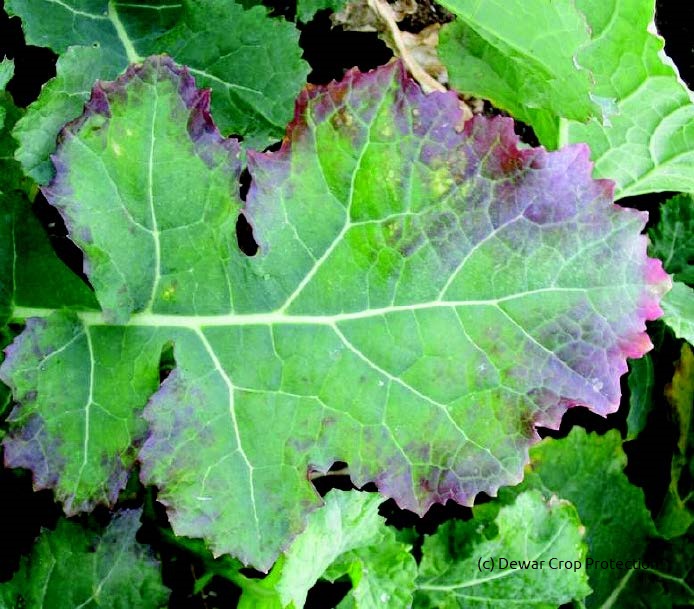- Home
- Knowledge library
- Turnip yellow virus (TuYV) management in oilseed rape
Turnip yellow virus (TuYV) management in oilseed rape
TuYV is the most important viral disease of oilseed rape in the UK. Learn about the principal virus vector – the peach–potato aphid (Myzus persicae) – and how to reduce economically damaging levels of infection.
Peach–potato aphid (TuYV vector in cereals)
Why is TuYV such an issue in winter oilseed rape?
Many peach–potato aphids carry TuYV. Infected crops are associated with decreased yields (by up to 30%), with seed production and oil content affected. Very heavy aphid infestations cause direct feeding damage. This aphid species is resistant to several active ingredients. As a result, control relies heavily on integrated pest management (IPM).
How to manage TuYV risks in winter oilseed rape
- Select lower-risk fields, such as those away from alternative host crops
- Encourage natural enemies of aphids. Note: these can help control aphid numbers, but may not prevent virus transmission
- Use varieties with specific recommendations for TuYV resistance (see Recommended List)
- Manage ‘green bridges’ that act as a source of virus-carrying aphids (e.g. destroy weed species that act as hosts)
- Be aware of the complex relationship between air temperature, drilling date and virus-infection risk
- Typically, early season virus transmission carries the greatest risk to the crop
- In general, later-drilled winter crops are at lower risk
- Use monitoring tools to assess aphid activity
- No satisfactory spray thresholds exist. If aphids are present, assume they carry virus
- Peach–potato aphid is resistant to a number of active ingredients. Follow insecticide resistance guidance to target any necessary sprays
- Select TuYV-resistant varieties, where appropriate
How do aphids spread TuYV?
Although transmitted by other aphid species, the peach–potato aphid is the main vector of TuYV. The aphid feeds on several host plants. In addition to oilseed rape, the aphid affects most brassica types, lettuce, spinach, peas and beans, as well as several common weed species.
In the autumn, aphids fly away from other crops, particularly sugar beet, vegetable brassicas and potatoes, and locate newly emerged oilseed rape, where they typically feed on the underside of leaves. Up to 72% of winged aphids carry the virus and their feeding activity transmits the virus to the crop.
The prevalence of TuYV varies from year to year but tends to be relatively high in southern England and in areas of high brassica production, such as Lincolnshire and Suffolk.
Air temperature, drilling date and virus risk
Weather, particularly air temperatures, affects aphid populations and, therefore, TuYV risk. As for anything involving natural systems, there is a great degree of variation, but the following rules apply in most situations:
- Infection risk is higher when aphids are more numerous
- The earlier the infection, the greater the impact on yield
- Mild autumns favour aphid migration and reproduction
- Aphid activity is greatly reduced at temperatures below 3°C
- Early sown winter crops tend to be at greatest risk during warm autumns
- Mild winters increase the risk of a larger and earlier spring migration in early sown crops
- Cool winters can lead to a smaller spring migration and larger summer migration, meaning late-sown crops are at higher risk from virus transmission
What do TuYV symptoms look like?
In oilseed rape, symptoms of TuYV infection do not usually show until late spring/early summer, appearing as purple tingeing of leaf edges and pods. This is easily mistaken for frost damage, nutrient deficiency or other stresses.
Find out more about peach–potato aphids
Our pest encyclopaedia features the most important aphids of UK field crops, as well as their natural enemies. Learn more about aphid biology, such as their life cycles, to help you better manage populations in your crops.
Peach–potato aphid (TuYV vector in cereals)
Aphid monitoring and chemical control
Monitor crops for aphid activity during the autumn using sticky traps and follow AHDB Aphid News for information on regional aphid activity. Peach–potato aphid is resistant to a number of active ingredients, and options for chemical control are limited. It is essential to follow resistance management guidance and to target chemical control carefully.
 Dewar Crop Protection
Dewar Crop Protection
TuYV symptoms in oilseed rape. Photo courtesy and copyright of Dewar Crop Protection Ltd.

